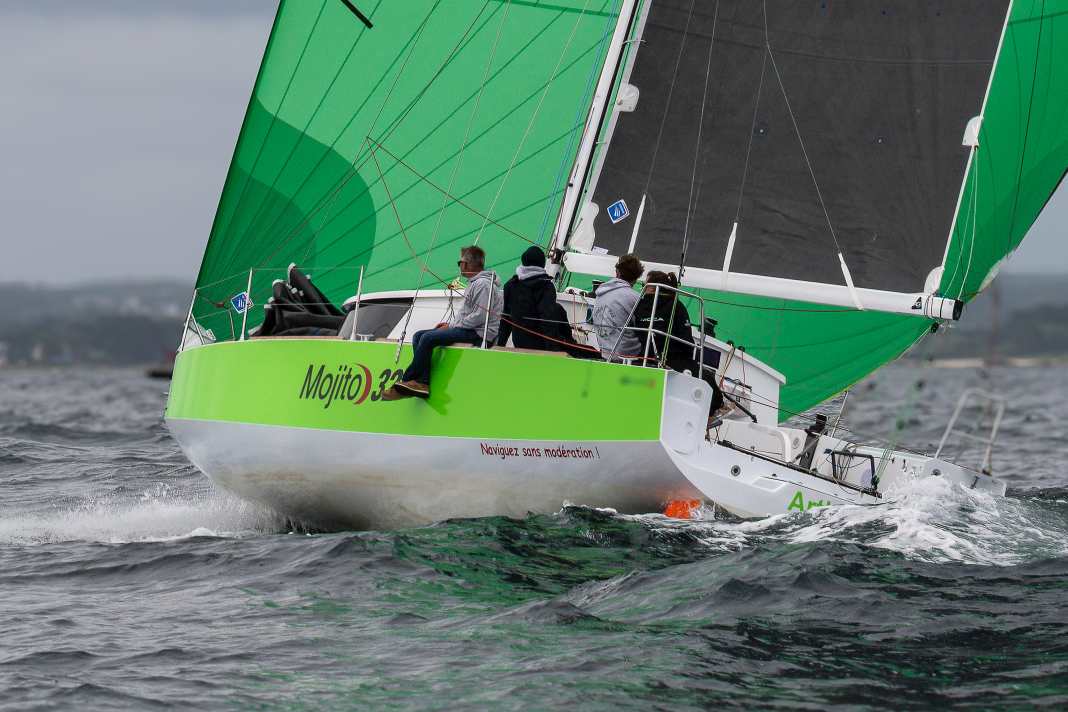





Four years ago, the shipyard in Concarneau presented a touring version of the successful mini under the type designation Mojito 650. The flounder-like boat with the distinctive scow bow was described in the YACHT test as "perhaps the smallest deck saloon yacht". Now the boat builders in Brittany are further developing the independent concept with a larger model. And with success: shortly after the market launch in spring 2025, the shipyard has already completed three boats of the new Mojito 32 type, a fourth is under construction and more have been ordered.
For falling dry with a swivelling keel
The mini and scow pope David Raison has also supplied the design plans for the Mojito 32, this time supported by naval architect Pierre Delion. The advantage of boats with scowbows lies primarily in their better and more balanced sailing characteristics on space wind courses. The design of the Mojito 32 also includes an electro-hydraulically retractable swivelling keel and two rudder blades. The boat can easily fall dry with additional wading props. Aluminium legs are extended and locked in place on both sides by means of laminated tubes. IDB Marine also offers this extremely innovative system as an in-house development exclusively for the boats in the Malango cruising range.
The shipyard wants to position the Mojito 32 on the market as a performance cruiser with high performance capabilities. The boat is also specifically designed to meet the requirements of regatta sailors, particularly for longer offshore routes in single or double-handed mode - the keyword here is transquadra. The high-performance sail plan with square-head mainsail and overlapping genoa as well as the relatively low total weight of just under three tonnes stand for this. The sail carrying capacity is a very high 5.6 - a figure that epitomises the performance of powerful regatta yachts. A gennaker or a code zero is used on a widely extendable bowsprit. A trough is moulded into the foredeck for the trunk; this allows the shipyard to dispense with a hull passage so that no water can enter the ship.
Sporty on the outside, cosy and suitable for touring on the inside
Despite all its sportiness, the Mojito 32 is fully equipped for touring below deck - with two double cabins, a spacious wet room, galley and navigation. There is also plenty of space aft on the port side for a large forecastle, which will also be accessible from the inside through a hatch. The shipyard attaches great importance to sustainable construction and the smallest possible ecological footprint: the hull and deck are built using a sandwich construction with glass and flax fibres and a foam core made from recycled PET bottles. An electric motor is also available as an alternative to the standard built-in diesel engine. The price for the Mojito 32 is 227,335 euros - including 19 per cent VAT, but still without sails and electronics.
The comprehensive test report on the Mojito 32 will be published in YACHT issue 6/2026, which will be available from the beginning of March.
Technical data Mojito 32
- Designer: David Raison / Pierre Delion
- Hull length: 9.80 m
- Width: 3.45 m
- Draught with swing keel: 1.00 m - 2.73 m
- Weight: 3.65 tonnes
- Ballast/proportion: 1.25 t / 34 %
- Mainsail (Square-Head): 37,0 m2
- Genoa (110 %): 31.0 m2
- Gennaker: 111.0 m2
- Engine: Built-in diesel Yanmar 21 hp
- Engine optional: BellMarine 10 kW electric motor
- Price: 227,335 euros, gross incl. 19% VAT.
Further links that may be of interest

Michael Good
Editor Test & Technology
Michael Good is test editor at YACHT and is primarily responsible for new boats, their presentation and the production of test reports. Michael Good lives and works in Switzerland on the shores of Lake Constance. He has been sailing since childhood and, in addition to his professional activities, has also been an active regatta sailor for many years, currently mainly in the Finn Dinghy and Melges 24 classes. He is also co-owner of a 45 National Cruiser built in 1917. Michael Good has been working for the YACHT editorial team since January 2005 and has tested around 500 yachts, catamarans and dinghies in that time.
